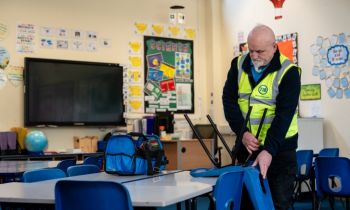At a time when schools have only just begun to plug the learning gaps that appeared as a result of the pandemic, there is additional pressure to minimise the effect of summer learning loss as the new school year begins.
I have seen the number of children unsettled by the thought of getting a new teacher, moving classes or changing schools increase five-fold in recent months. What’s more, those feeling anxious now include children who would previously not have given the change of a new school year a second thought.
So, our school has taken a fresh look at how we tackle summer learning loss this year and there are four key strategies we have put in place to help get children back on track as quickly as possible.
1. Set exciting and engaging activities for home
We want to encourage children to participate fully in the wide range of activities we create for them to do at home, which supplement the learning going on in school and help us close the gaps.
Activities designed to be completed outside of the classroom are purposefully devised to be fun, stress-free and engaging, with the learning bit almost invisible.
Challenges include nine before nine, a fun competition where pupils are asked to read nine books before they reach their ninth birthday. They get a list of nine books which they tick off once they’ve read them and get a prize for completing them all. We run a similar activity for eleven-year-olds, which also works well.
There’s also Crazy Reader, which encourages the children to find the most unusual (but safe) place to read a book and make a note of the details to share in class when they are back in school.
Pupils love this and their creativity in choosing locations knows no bounds.
2. Support anxious parents
It’s not only the children who are experiencing anxiety about returning to the classroom, many more parents are feeling it too.
Adult emotions can often rub off on children so it’s worth considering what support families might need if they are concerned that their child may have fallen behind over the summer or they’re worried about how they will cope in a new learning group.
Consider launching a ‘new school year learning week’ to help. You could provide a toolkit packed with advice for parents to boost their confidence in supporting their child from home into and beyond the new term.
Another option is a parental support group on social media to give parents somewhere to go when they’re looking for new ideas for fun activities to support learning at home or how to incorporate literacy and maths skills into play.
3. Stress-free assessment
The first few days and weeks of the new school term are typically about welcoming new pupils and settling those returning into the classroom back into the routine of learning. But schools will also be focused on identifying where learning may have slipped over the summer.
It is essential to assess children’s literacy skills early as a loss of spelling or reading ability over the holiday can have a major impact on learning in almost every area of the curriculum.
The best way to get clarity on where children are in their reading development is to assess them in a fun way. With no pressure of a big paper test, you are much more likely to get an accurate picture of their current ability and the information you need to support their ongoing progress.
In my school, we use a software programme called Lexplore Analytics to do this, which automatically monitors eye movements as a child reads, out loud and silently. The tool uses AI and eye tracking technology to measure when, where, and how a student’s eyes move in relation to the words they are reading and quickly analyses their skills.
Our pupils have told us they find the experience of taking the digital test fun and they don’t even feel like they are being assessed.
This means we get the information we need to see where extra support is required and can act quickly to provide it, whether that’s help with comprehension, sentence structure or word recognition, without pupils feeling stressed.
4. Prepare children earlier
Pupils need to feel safe and secure before any meaningful learning can take place. So, one of the key changes we have made to better prepare children for a new school year is to launch preparations for the summer break much earlier than we used to.
Many weeks before the summer term ends, the children will start working in the learning groups to which they will return after the holidays. They’ll be taught in their new classrooms, by their new teachers too.
This allows pupils to familiarise themselves with different surroundings, make friends and settle into the new routines they can expect in the new academic year.
Making this preparation part of your regular school calendar each year will help ensure the children are much more at ease when the new term begins.
This means the initial days and weeks of the new academic year, which might previously have been spent settling pupils in, can be focused on uncovering and addressing learning gaps.
Children who are happy and confident about what the new academic year will bring are much more likely to recover the skills they may have lost being away from their teachers and peers.
With planning and collaboration, teachers, parents and children can work together to help ensure the new term gets off to a flying start.
What we know about summer learning loss
Teachers tend to notice that their pupils have become less attentive, perhaps a little lazier and that the return to school in September can take a week or two of adjustment. This is not surprising given that most will have done little, if any, activities relating to schoolwork during their holiday.
But few studies have been done to show, categorically, that summer learning loss actually occurs.
However, research carried out by academics at Northumbria University in 2017 – Investigation of Summer Learning Loss in the UK: Implications of Holiday Club Provision (tinyurl.com/SummerLLoss) - looked at whether summer learning loss occurred in spelling and reading in 77 primary aged children aged from five-10 years, attending three schools in areas of low socio-economic status in Scotland and the North-East of England.
The children were tested three times – before and immediately after a seven-week summer break, and again after seven weeks of teaching.
Their findings showed that spelling scores were significantly higher at the start of the holiday than when the children returned to school in September. But they had improved beyond the pre-holiday scores by the end of the first seven weeks of term.
When it came to reading, researchers found no significant changes, though there were some variations between the schools taking part in the study.
This was thought to be the first such study in the UK to demonstrate that after a summer break of seven weeks, some summer learning loss – or at least a stagnation in learning - had occurred.
Aimee Cave is a SENCo and assistant head at Pocklington Junior School in East Yorkshire and a consultant for Lexplore Analytics.




_945_573_80_int_s_c1_c_t.jpg)





